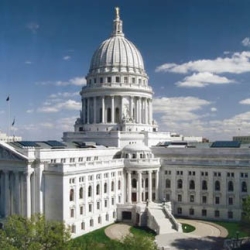Land of Corporate Blackmail
A bombshell story shows Wisconsin is a national leader in tax handouts to business.
In 2009, the company that ran Mercury Marine’s Fond du Lac plant put a gun to the head of its workers: either agree to wage givebacks, they warned, or we’ll move your jobs to our plant in Stillwater, Oklahoma.
The drama soon involved Gov. Jim Doyle, who was bashed for not being pro-business enough to prevent the company’s move. The criticism extended to Wisconsin’s tax structure; as Rep. Bob Ziegelbauer, the independent from Manitowoc declared, for companies like Mercury Marine, “the higher tax burden they now find in Wisconsin is a powerful incentive to look elsewhere.”
In fact, the company’s “burden” could hardly have been lighter. As a study by the liberal Institute for Wisconsin’s Future later found, Mercury Marine’s parent company Brunswick had paid not one dollar in Wisconsin corporate income taxes in the eight previous years, though its total profits over that period were $1.1 billion.
Nor was this uncommon. A previous study by the IWF, checking net taxes paid (which are public records in Wisconsin) had found a majority of large companies here consistently paid zero in state corporate income taxes.
For that matter, Brunswick was doing pretty good on labor costs. As a letter to stockholders from Chairman and CEO Dunstan E. McCoy (quoted by IWF) noted: “Our employees significantly contributed to our cash position through salary actions, periodic unpaid furloughs, and other measures which directly affected their pay and benefits.”
Led by conservative talk radio, the pressure on the union and on Doyle to play ball with Mercury Marine was enormous. The result was complete capitulation.
The union, which had overwhelmingly rejected the company’s demands, did an about face and agreed to a seven-year pay freeze and reduced health care coverage for employees. Doyle and the state gave the company a generous package worth $70 million. Fond du Lac County provided a $50 million loan, paid for by a new 0.5 percent county sales tax, and the City of Fond du Lac threw in another $3 million in financial aid.
The results must have stunned Oklahoma, one of the country’s leaders in corporate giveaways. Wisconsin had made an offer the company couldn’t refuse, and it would ultimately close its 700,000 square-foot Stillwater plant and move many of the jobs to Fond du Lac.
But Wisconsin, it turns out, is also a paradise for companies seeking handouts, as a ground-breaking story in the New York Times documents. The story’s online tracker allows you to check any state, which shows Wisconsin spends $1.53 billion in taxes per year on incentives for business. That equals 10 percent of the state’s annual budget and costs $268 per per person.
Wisconsin, land of the supposedly bad business climate, ranks ahead of 33 other states and the District of Columbia in per-capita payments to business.
Compared to the states that surround us, only Michigan gives more in corporate handouts. (And as the home of three major American automakers, it is something of a special situation.) Michigan gives $672 per capita to businesses, followed by Wisconsin’s $268, well ahead of Indiana ($142), Illinois ($117), Iowa ($73) and Minnesota ($45), the Times data shows. In short, Michigan and Wisconsin make it much tougher for surrounding states to resist calls for corporate welfare.
Even as they have given $80 billion annually to companies, states have slashed public services while raising taxes a collective $156 billion, the Times notes. “To help balance its budget last year, Texas cut public education spending by $5.4 billion…Yet highly profitable companies like Dow Chemical and Texas Instruments continue to enjoy hefty discounts on their school tax bills through one of the state’s economic development programs.”
And that $80 billion is just for state handouts: it doesn’t include local giveaways, like the $53 million given to Mercury Marine by Fond du Lac county and city.
And yet, these governments have no idea if these incentives were worth it, “because they rarely track how many jobs are created,” the Times story noted. And when they do track it, they admit, “it is impossible to know whether the jobs would have been created without the aid.”
Furthermore, the jobs created may later disappear as companies close or move plants. Auto manufacturers have received $13.9 billion in government incentives since 1985, the story notes. Meanwhile, automakers have closed more than 267 American plants since 1979.
The only clear winners here are the stockholders and executives of the companies getting all the goodies. The executives at Brunswick were already paid lucratively, garnering $10.5 million in total compensation in 2009. But after Wisconsin delivered all those incentives and worker givebacks for Brunswick’s Mercury Marine plant, the rich got richer. Brunswick’s executives hauled in $13.4 million in 2010, including $6.6 million for top dog McCoy, and $15.8 million in 2011, with $7.6 million going to McCoy. Yes, Wisconsin’s business climate has been blessedly balmy for them.
Short Takes
-The Times story found that 48 companies received at least $100 million in state tax incentives since 2007. Milwaukee based Johnson Controls was one of them, garnering $162 million (including just $3 million from Wisconsin.) The full list of incentives given by Wisconsin can be found here.
-Perhaps the most preposterous example of these subsidies involved the states of Kansas and Missouri. “Soon after Kansas recruited AMC Entertainment with a $36 million award last year, the state cut its education budget by $104 million. AMC was moving only a few miles, across the border from Missouri… A few months later, Missouri lured Applebee’s headquarters from Kansas,” the story reported. “It just gives me a sick feeling in the pit of my stomach,” Sean O’Byrne, the vice president of the Downtown Council of Kansas City told the Times. “It sounds like I’m talking myself out of a job, but there ought to be a law against what I’m doing.”
A version of this column was originally published by the Madison weekly Isthmus.
Murphy's Law
-
Top Health Care Exec Paid $25.7 Million
 Dec 16th, 2025 by Bruce Murphy
Dec 16th, 2025 by Bruce Murphy
-
Milwaukee Mayor’s Power in Decline?
 Dec 10th, 2025 by Bruce Murphy
Dec 10th, 2025 by Bruce Murphy
-
Total Cost of Foxconn Is Rising
 Dec 8th, 2025 by Bruce Murphy
Dec 8th, 2025 by Bruce Murphy























Dunstan E. McCoy: stepping up to the bargaining table… er, trough!
One of my mother’s favorite sayings was, “The empty bucket makes the most noise”. I’m hopeful that our two emptiest buckets, Sykes and Belling, have read this revealing expose’.
I know the Thanksgiving holiday has passed, but gratitude is a virtue that we should try to nurture throughout the year, isn’t it? So in that spirit, and for that matter in the holiday spirit, wouldn’t it be boss for Mercury Marine to give a boat to every public employee in the state that experienced a loss of income this year. Remember Governor Walker’s lament that the State of Wisconsin was broke. So now it appears that the State was broke at least in part due to the willingness of obeisant public officials to give in to corporate threats. In effect, public employees transferred part of their earnings to Mercury Marine. Now that I think of it, maybe it would be better if Mr McCoy got a list of the public employees and just transferred the money back. He could include a catalogue of Mercury Marine products, just in time for the holidays.
I’m looking forward to reading the New York Times piece in depth. The public trough, we should all remember, is comprised of a variety of flows – local, state, regional, and federal. In a lot of states the fed’s contribution to the trough not only outweighs the state’s need to step up but nearly overwhelms those state’s economies. Think of what kind of economy Wisconsin could have, for instance, if we could only be Virginia. Virginia receives $55 billion a year in federal investment; Wisconsin receives $8.8 billion. Looking at it another way, Virginia receives close to $2 in federal investment for every $1 of federal taxes paid. Wisconsin? Less that 90 cents on the dollar. Wisconsin is in trouble in many respects and is stuck, unfortunately, having to dig its own way out of the trough. Other states which are well-advantaged by the flow of fed funds, the geographic luck-of-the-draw (energy industry) or other factors/characteristics, won’t have the same challenge we face. Once we understand the global dynamic of the entirety of the trough, we can then dig in and determine the relative merit of what has been done in the name of saving jobs in Wisconsin.
Bruce,
I thought you might be interested in the following report done through the Pew Center on States about how effectively (or not) various states with tax incentives for growing business evaluate how well their programs work. WI does comparatively well in this study and, as you know, Pew does quality, rigorous, and pretty non-partisan research.
http://www.pewstates.org/research/reports/evidence-counts-85899378806
To be clear, the study takes no position on whether or not tax incentives per se are an appropriate use of tax dollars nor are they evaluating specific programs. That said, the inclusion in any policy of clear and appropriate metrics and an intent to consistently evaluate is generally a heartening indication of an intent to monitor and optimize implementation informed by results.
Chris